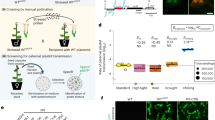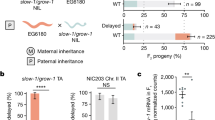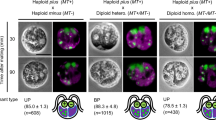Abstract
Extrachromosomal inheritance is ubiquitous among plants and animals; however, most extrachromosomal factors are uniparentally inherited through females, but not through males1. Examples include chloroplasts, mitochondria and a variety of intracellular symbionts. The only known exception to maternal extrachromo-somal inheritance in an animal is a paternally transmitted sex ratio factor (psr) which causes all-male families in the parasitic wasp, Nasonia vitripennis2,3. Normally in this wasp, male offspring are haploid and develop from unfertilized eggs whereas females are diploid and develop from fertilized eggs. The psr factor is either a venereally transmitted infection which prevents egg fertiliz-ation (and therefore causes all-male families), or a factor transmit-ted to eggs by the sperm of males carrying psr, which somehow prevents incorporation of the paternal chromosomes. Here we report that sperm from psr males fertilizes eggs, but that the paternal chromosomes are subsequently condensed into a chromatin mass before the first mitotic division of the egg and do not participate in further divisions. Resulting haploid offspring are male, but have inherited the paternal factor. This extrachromo-somal factor promotes its own transmission at the expense of the paternal chromosomes, and therefore can be considered a 'selfish' genetic element.
This is a preview of subscription content, access via your institution
Access options
Subscribe to this journal
Receive 51 print issues and online access
$199.00 per year
only $3.90 per issue
Buy this article
- Purchase on Springer Link
- Instant access to full article PDF
Prices may be subject to local taxes which are calculated during checkout
Similar content being viewed by others
References
1. Birky, C. W. Jr Science 222, 468–475 (1983). 2. Werren, J. H., Skinner, S. W. & Charnov, E. L. Nature 293, 467–468 (1981). 3. Werren, J. H. & van den Assem, J. Genetics 114, 217–233 (1986). 4. Wylie, H. G. Can. Ent. 98, 645–653 (1966). 5. Werren, J. H. Evolution 37, 116–124 (1983). 6. Charnov, E. L. The Theory of Sex Allocation (Princeton University Press, 1982). 7. Werren, J. H. Science 208, 1157–1160 (1980). 8. Skinner, S. W. Science 215, 1133–1134 (1982). 9. Skinner, S. W. Genetics 109, 745–754 (1985). 10. Werren, J. H., Skinner, S. W. & Huger, A. M. Science 231, 990–993 (1986). 11. Skinner, S. W. thesis, Univ. Utah (1983). 12. Sears, B. B. Stadler Symp. 15, 119–138 (1983). 13. Ryan, S. L. & Saul II, G. B. Molec. gen. Genet. 103, 24–36 (1968). 14. Saul, G.– B., Whiting, P. W., Saul, S. W. & Heidner, C. A. Genetics 52, 1317–1327 (1965). 15. Nur, U. R. Ent. Soc. Lond. Symp. 10, 97–117 (1980). 16. Bull, J. J. The Evolution of Sex Determining Mechanisms (Benjamin, Menlo Park, California, 1983). 17. Mulcahy, D. & Pascho, R. J. Science 225, 333–335 (1984). 18. Dawkins, R. The Selfish Gene (Oxford University Press, 1976). 19. Doolittle, W. F. & Sapienza, C. Nature 284, 601–603 (1980). 20. Orgel, L. E. & Crick, F. H. C. Nature 284, 604–607 (1980).
Author information
Authors and Affiliations
Rights and permissions
About this article
Cite this article
Werren, J., Nur, U. & Eickbush, D. An extrachromosomal factor causing loss of paternal chromosomes. Nature 327, 75–76 (1987). https://doi.org/10.1038/327075a0
Received:
Accepted:
Issue Date:
DOI: https://doi.org/10.1038/327075a0
This article is cited by
-
A crazy ants’ crazy form of reproduction: Causes and consequences
Journal of Biosciences (2024)
-
Ability of a selfish B chromosome to evade genome elimination in the jewel wasp, Nasonia vitripennis
Heredity (2023)
-
Non-Mendelian segregation and transmission drive of B chromosomes
Chromosome Research (2022)
-
Additional evidence for the genomic imprinting model of sex determination in the haplodiploid wasp Nasonia vitripennis: isolation of biparental diploid males after X-ray mutagenesis
Heredity (2006)
-
Clonal reproduction by males and females in the little fire ant
Nature (2005)
Comments
By submitting a comment you agree to abide by our Terms and Community Guidelines. If you find something abusive or that does not comply with our terms or guidelines please flag it as inappropriate.



